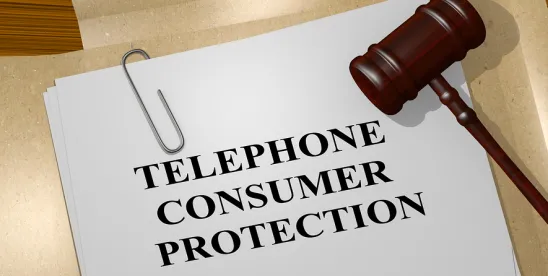The Ninth Circuit recently held oral argument in a significant First Amendment challenge to the TCPA –Gallion v. Charter Communications. Although the case involves many issues that could prove interesting, this post will focus on the First Amendment challenge, as it has the broadest implication to TCPA World. Fair warning: this post will be a bit long, as there are many moving parts.
Before we dive into the argument, a bit of background.
The TCPA has withstood multiple appellate challenges to its constitutionality, despite being an extremely broad infringement on constitutionally protected speech. But two events in 2015 gave new life to First Amendment challenges to it. First, Congress created the government-backed debt exception to the TCPA. Second, the Supreme Court decided Reid v. Town of Gilbert, 135 S. Ct. 2218 (2015). These two developments are at the heart of the current First Amendment challenges to the TCPA and featured prominently in oral argument. Collectively, they are responsible for the current trend of courts subjecting the TCPA to strict scrutiny.
The government-backed debt exception was created as part of the Bipartisan Budget Act of 2015. Apparently recognizing the extraordinary burden TCPA lawsuits place on debt collection, the Act exempts calls to collect debts “owed or guaranteed” by the federal government. The “guaranteed” prong is critical. It extends the exemption to debt issued by a private lender and collected by a private debt collector, as long as the federal government ultimately guaranteed the debt. The content-based discrimination is obvious. The same debt collector could make two calls to the same individual to collect debt issued by the same lender – one for a purely private student loan, and one for a student loan backed by the federal government but issued by the private lender. The first call is subject to the TCPA because the debt collector asked for payment on a purely private loan. The second call is not subject to it because the debt collector asked for payment on a government-backed loan. Same caller. Same lender. Same called party. Different result; thus, the TCPA is a content-based restriction.
Reid v. Town of Gilbert extended strict scrutiny to content-based restrictions on speech for types of speech that were previously subjected to the form of intermediate scrutiny applicable to commercial speech. Here’s the key holding: “[c]ontent-based laws – those that target speech based on its communicative content – are presumptively unconstitutional and may be justified only if the government proves that they are narrowly tailored to serve compelling state interests.” 135 S. Ct. at 2226 (emphasis added). Thus, if the TCPA is content based, it is presumptively unconstitutional. And if it was not content based before the government-backed debt exemption, it certainly is after.
Enough background; now for the argument. The First Amendment portion of the argument involved four main issues: 1) whether the TCPA is content based; 2) whether it is narrowly tailored; 3) whether there is a compelling governmental interest; and 4) whether the government-backed debt exception is severable. Other issues arose during the argument, but these issues are at the core of the constitutional challenge.
The plaintiff and the federal government as amici argued that the TCPA is not content based because the government-backed debt exception is a relationship-based exemption, not a content-based exemption. This argument draws on a line of cases that hold restrictions based on the relationship between the speaker and listener, rather than the content of the communication, are not subject to strict scrutiny. The judges seemed skeptical of this argument. As the defendant pointed out, it is not the relationship but the content of the communication behind the exemption. The lender-borrower relationship does not trigger the exemption; the fact that the lender or debt collector requests payment on a particular type of account triggers it.
The second issue – narrow tailoring – received much less attention from the court, which is disappointing. The government and plaintiff argued that other alternatives, such as opt-out provisions, do not adequately address the consumer privacy interests behind the TCPA. But as the defendant pointed out, the FCC has created exemptions for calls ranging from fraud alerts to medical-related communications provided they have opt-out procedures. If opt-out procedures are sufficient for those calls, they should be sufficient for others as well. And the myriad FCC-created exemptions further highlight the extent to which the TCPA is content based and wholly unworkable.
One issue where the argument missed the mark involved the compelling government interest. The plaintiff and government claimed that the compelling government interest is “consumer privacy” writ large. But that isn’t the correct focus. Under Reid v. Town of Gilbert, the government must show a compelling interest in the differential treatment, not the statute as a whole. Neither the plaintiff nor the government made a real effort to justify a compelling interest in treating government-backed debt different from purely private debt. Instead, they took the tried-and-true approach of bashing actual robocalls from spoofed numbers. But although the TCPA was designed to combat those type of calls, the FCC and courts – the Ninth Circuit in particular – have extended its reach well beyond spoofed robocalls and scams. Which is why it now fails strict scrutiny, or at least should.
The final issue received the lion’s share of interest from the court: whether the government-backed debt exemption is severable. The judges expressed skepticism about throwing out the entire statute instead of simply excising the exemption. At the same time, however, they seemed hesitant to rely on any severability cases that did not involve the First Amendment. As the defendant pointed out, severability is rarely used in a manner that would restrict more speech; it is invoked to sever a restriction, not an exemption. The panel seemed genuinely torn on this issue, and the TCPA’s survival could very well turn on it.
In an ironic twist, the panel at one point stated that the TCPA “says what is says” and that they would have to “rewrite the statute” to “infuse common sense into it.” Which is not actually true. To infuse common sense back into the TCPA, you would simply need to apply the statute’s actual definition of an ATDS – which requires a random or sequential number generation – instead of the Ninth Circuit’s rewrite in Marks v. Crunch. In fact, if courts and the FCC apply the actual words of the statute, it would be limited to its original congressional purpose and likely pass constitutional muster.




 />i
/>i

